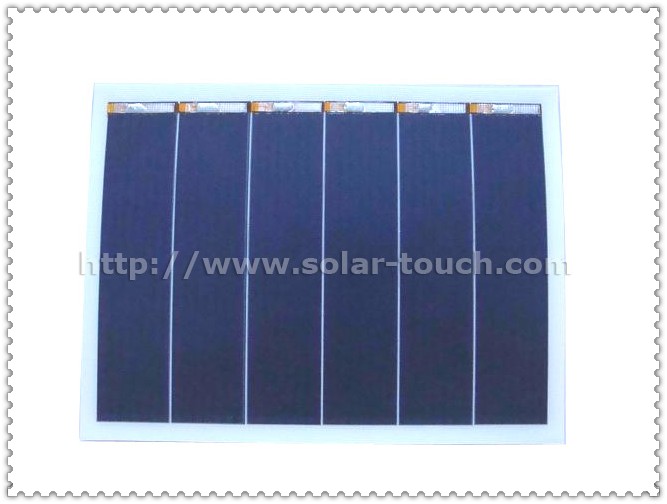タイトルまたは説明
Flexible Solar Panel
(6SC1):
Rated Power MPP Pmax (W): 2.7**5%
Operating Voltage Vmpp (V):
1.5**1%
Operating Current lmpp (A):
1.8*4%
Weight (g): **5
Dimensions (mm): **2×**7×1.1
Surface of solar cell (m2):
0.**1
nTypically ******0
micrometers thick
n*0 kg of silicon
per 1 kWp of PV
nP-N
structure
nAbsorb red light
well
n*0% more efficient
solar cells have been produced in the lab where a doped amorphous
silicon layer is added to the crystalline wafer
nPolycrystalline
silicon modules are generally **4 % less efficient than single
crystal silicon modules, but they can be less expensive to
produce
nThe energy payback
time of the present-day single crystal modules is typically
around *6 months
nTriple-junction
cells reduce light-induced degradation
Each cell is composed of three
semiconductor junctions stacked on top of each other. The bottom
cell absorbs the red and infrared photons, while the middle cell
absorbs the green photons and the top cell absorbs the blue
photons. This spectrum splitting capability is the key to higher
efficiency and reduction in light-induced degradation.
nUsing amorphous
alloys of silicon and germanium adjusts the band gap
energies
nAbsorb blue light
well
nCan be an
automated, continuous production process
nLightweight,
durable and flexible, making it ideal for portable solar
cells
Solar energy efficiency is
closely related to the photons absorption from solar
spectrum.
The solar spectrum is
electromagnetic radiation made up of a range of
wavelengths.
•Ultraviolet 0.*4 –
**0 nm ……9%
•Visible
******0 nm ……*7%
•Infra-Red
******0,**0 nm ……*4%
•X-Ray and Gamma
Rays
•Microwaves and
Radio Waves
Crystalline modules have good
response in the red part of the visible spectrum. We see this
type of light on clear winter days. The modules have a high
relative outdoor efficiency when the sunlight intensity is high
(1,****1,**0 W/m2).
Thin-film amorphous Silicon
(a-Si) modules have good response in the blue part of the visible
spectrum. We see this type of light in the summer and on cloudy
days (diffuse light). The modules have higher relative
outdoor efficiency when the sunlight intensity is low (*****0
W/m2).
Shading caused by bird dropping,
water pudding, concentration of dust or dirt, ash zone and leaves
can easily reduce the output of photovoltaic module and in
serious cases even shut down the entire module completely.
Therefore, the combination of construction and design of
photovoltaic module is essential for the outdoor
efficiency.
A-Si modules, use unique material
and technology, reduce output power loss caused by the shading
and soiling effect to less than 4.5%.

